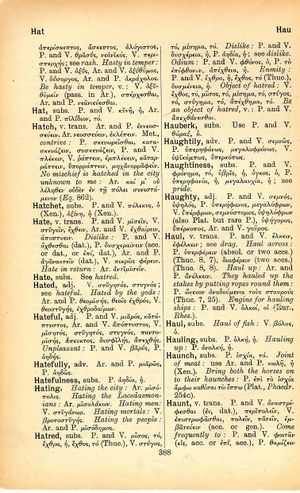haunt: Difference between revisions
ἐς δὲ τὰ ἔσχατα νουσήματα αἱ ἔσχαται θεραπεῖαι ἐς ἀκριβείην, κράτισται → for extreme diseases, extreme methods of cure, as to restriction, are most suitable (Corpus Hippocraticum, Aphorisms 1.6.2)
(CSV4) |
m (Woodhouse1 replacement) |
||
| Line 1: | Line 1: | ||
{{Woodhouse1 | {{Woodhouse1 | ||
|Text=[[File:woodhouse_388.jpg|thumb|link={{filepath:woodhouse_388.jpg}}]] | |Text=[[File:woodhouse_388.jpg|thumb|link={{filepath:woodhouse_388.jpg}}]] | ||
P. and V. ἀναστρέφεσθαι (ἐν, dat.), περιπολεῖν, V. ἐπιστρωφᾶσθαι, πολεῖν, πατεῖν, ἐμβατεύειν (acc. or gen.). | ===verb transitive=== | ||
[[prose|P.]] and [[verse|V.]] [[ἀναστρέφεσθαι]] (ἐν, dat.), [[περιπολεῖν]], [[verse|V.]] [[ἐπιστρωφᾶσθαι]], [[πολεῖν]], [[πατεῖν]], [[ἐμβατεύειν]] (acc. or gen.). | |||
[[come frequently to]]: [[prose|P.]] and [[verse|V.]] [[φοιτᾶν]] ([[εἰς]], acc. or [[ἐπί]], acc.), [[prose|P.]] [[θαμίζειν]] ([[εἰς]], acc.). | |||
[[dwell in]]: [[prose|P.]] and [[verse|V.]] [[ἔχειν]] (acc.), [[νέμειν]] (acc.) (or mid.) (rare [[prose|P.]]), [[Aristophanes|Ar.]] and [[verse|V.]] [[ναίειν]] (acc.); see [[inhabit]]. | |||
[[haunt as a ghost]] or [[haunt as a dream]]: [[prose|P.]] and [[verse|V.]] [[φοιτᾶν]] (absol. or dat.). | |||
[[would he not in hatred haunt me with his curse]]? [[verse|V.]] [[οὐκ ἄν με μισῶν ἀνεχόρευ' Ἐρινύσιν]]; ([[Euripides|Eur.]], ''[[Orestes]]'' 582). | |||
[[be haunted]] ([[by ghosts]], [[dreams]], etc., v.: [[prose|P.]] and [[verse|V.]] [[συνέχεσθαι]] (dat.), [[συνεῖναι]] (dat.), [[verse|V.]] [[ἐπισκοπεῖσθαι]] (dat.) ([[Aeschylus|Aesch.]], ''[[Agamemnon]]'' 13). | |||
[[be haunted by feelings]]: [[prose|P.]] and [[verse|V.]] [[συνοικεῖν]] (dat.), [[συνεῖναι]] (dat.). | |||
===substantive=== | |||
[[way of occupying oneself]]: [[Aristophanes|Ar.]] and [[prose|P.]] [[διατριβή]], ἡ. | |||
[[place of refuge]]: [[prose|P.]] and [[verse|V.]] [[καταφυγή]], ἡ. | |||
[[place one frequents]]: [[Aristophanes|Ar.]] and [[verse|V.]] [[ἐπιστροφαί]], αἱ, [[verse|V.]] [[ἀναστροφή]], ἡ, [[πορεύματα]], τά, [[ἤθη]], τά; see [[abode]]. | |||
[[hiding-place]]: [[verse|V.]] [[κευθμών]], ὁ, [[μυχός]], ὁ. | |||
}} | }} | ||
Revision as of 08:50, 20 May 2020
English > Greek (Woodhouse)
verb transitive
P. and V. ἀναστρέφεσθαι (ἐν, dat.), περιπολεῖν, V. ἐπιστρωφᾶσθαι, πολεῖν, πατεῖν, ἐμβατεύειν (acc. or gen.).
come frequently to: P. and V. φοιτᾶν (εἰς, acc. or ἐπί, acc.), P. θαμίζειν (εἰς, acc.).
dwell in: P. and V. ἔχειν (acc.), νέμειν (acc.) (or mid.) (rare P.), Ar. and V. ναίειν (acc.); see inhabit.
haunt as a ghost or haunt as a dream: P. and V. φοιτᾶν (absol. or dat.).
would he not in hatred haunt me with his curse? V. οὐκ ἄν με μισῶν ἀνεχόρευ' Ἐρινύσιν; (Eur., Orestes 582).
be haunted (by ghosts, dreams, etc., v.: P. and V. συνέχεσθαι (dat.), συνεῖναι (dat.), V. ἐπισκοπεῖσθαι (dat.) (Aesch., Agamemnon 13).
be haunted by feelings: P. and V. συνοικεῖν (dat.), συνεῖναι (dat.).
substantive
way of occupying oneself: Ar. and P. διατριβή, ἡ.
place of refuge: P. and V. καταφυγή, ἡ.
place one frequents: Ar. and V. ἐπιστροφαί, αἱ, V. ἀναστροφή, ἡ, πορεύματα, τά, ἤθη, τά; see abode.
hiding-place: V. κευθμών, ὁ, μυχός, ὁ.

